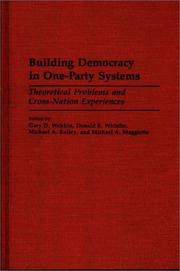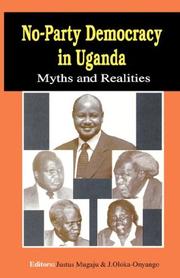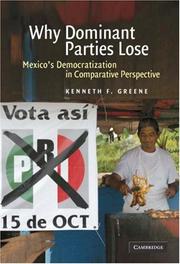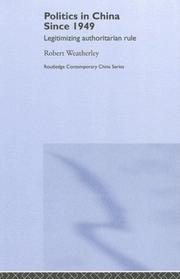| Listing 1 - 7 of 7 |
Sort by
|
Book
Year: 1969 Publisher: Paris : Librairie générale de droit et de jurisprudence,
Abstract | Keywords | Export | Availability | Bookmark
 Loading...
Loading...Choose an application
- Reference Manager
- EndNote
- RefWorks (Direct export to RefWorks)
Political parties --- Parti unique --- Partis politiques --- Political parties. --- Africa, Sub-Saharan.

ISBN: 0275945510 Year: 1993 Publisher: Westport, Conn. : Praeger,
Abstract | Keywords | Export | Availability | Bookmark
 Loading...
Loading...Choose an application
- Reference Manager
- EndNote
- RefWorks (Direct export to RefWorks)
Democracy --- One-party systems --- Démocratie --- Parti unique --- Case studies --- Case studies. --- Cas, Etudes de --- Cas, Etudes de

ISBN: 9970022040 Year: 2000 Publisher: Kampala Fountain
Abstract | Keywords | Export | Availability | Bookmark
 Loading...
Loading...Choose an application
- Reference Manager
- EndNote
- RefWorks (Direct export to RefWorks)
Political parties --- One party systems --- Democracy --- Partis politiques --- Parti unique --- Démocratie --- National Resistance Movement (Uganda) --- Uganda --- Ouganda --- Politics and government --- Politique et gouvernement --- One-party systems --- Démocratie --- Parties, Political --- Party systems, Political --- Political party systems --- Political science --- Divided government --- Intra-party disagreements (Political parties) --- Political conventions --- Single-party systems --- NRM
Book
ISBN: 0465005691 Year: 1970 Publisher: New York (N.Y.): Basic Books
Abstract | Keywords | Export | Availability | Bookmark
 Loading...
Loading...Choose an application
- Reference Manager
- EndNote
- RefWorks (Direct export to RefWorks)
Political systems --- One party systems --- Totalitarianism --- Parti unique --- Totalitarisme --- 321.6 --- -Totalitarianism --- -#SBIB:324H43 --- #SBIB:324H40 --- Totalitarian state --- Authoritarianism --- Collectivism --- Despotism --- Dictatorship --- Fascism --- National socialism --- Single-party systems --- Political parties --- Niet-democratische staatsvormen. Antidemokratie. Dictatuur. Totalitarisme--(politieke stelsels) --- Addresses, essays, lectures --- Politieke structuren: politieke partijen --- Politieke structuren: algemeen --- 321.6 Niet-democratische staatsvormen. Antidemokratie. Dictatuur. Totalitarisme--(politieke stelsels) --- One-party systems --- #SBIB:324H43 --- One-party systems.

ISBN: 9780521877190 0521877199 9780511509803 9780521139892 9780511335532 0511335539 0511333676 9780511333675 0511334958 9780511334955 1107182883 1281040592 9786611040598 1139133101 0511334354 0511509804 0521139899 Year: 2007 Publisher: Cambridge Cambridge University Press
Abstract | Keywords | Export | Availability | Bookmark
 Loading...
Loading...Choose an application
- Reference Manager
- EndNote
- RefWorks (Direct export to RefWorks)
Why have dominant parties persisted in power for decades in countries spread across the globe? Why did most eventually lose? Why Dominant Parties Lose develops a theory of single-party dominance, its durability, and its breakdown into fully competitive democracy. Greene shows that dominant parties turn public resources into patronage goods to bias electoral competition in their favor and virtually win elections before election day without resorting to electoral fraud or bone-crushing repression. Opposition parties fail because their resource disadvantages force them to form as niche parties with appeals that are out of step with the average voter. When the political economy of dominance erodes, the partisan playing field becomes fairer and opposition parties can expand into catchall competitors that threaten the dominant party at the polls. Greene uses this argument to show why Mexico transformed from a dominant party authoritarian regime under PRI rule to a fully competitive democracy.
One-party systems. --- Opposition (Political science) --- Democratization --- Presidents --- Comparative government. --- Parti unique --- Opposition (Science politique) --- Démocratisation --- Présidents --- Institutions politiques comparées --- Election --- One-party systems --- Comparative government --- Démocratisation --- Présidents --- Institutions politiques comparées --- Comparative political systems --- Comparative politics --- Government, Comparative --- Political systems, Comparative --- Political science --- Presidency --- Heads of state --- Executive power --- Political opposition --- Divided government --- Single-party systems --- Political parties --- Social Sciences --- Political Science --- Democratization - Mexico --- Presidents - Mexico - Election - 2000
Book
ISBN: 0801496969 0801423678 9780801423673 Year: 1990 Publisher: Ithaca (N.Y.): Cornell university press
Abstract | Keywords | Export | Availability | Bookmark
 Loading...
Loading...Choose an application
- Reference Manager
- EndNote
- RefWorks (Direct export to RefWorks)
Political parties --- Opposition (Political science) --- Representative government and representation --- Comparative government --- One-party systems --- Partis politiques --- Opposition (Science politique) --- Gouvernement représentatif --- Institutions politiques comparées --- Parti unique --- One party systems --- 321.7 --- #SBIB:324H40 --- Democratie. Plurale samenleving. Pluralisme. Democratische pluraliteit--(moderne democratie politieke stelsels) --- Politieke structuren: algemeen --- 321.7 Democratie. Plurale samenleving. Pluralisme. Democratische pluraliteit--(moderne democratie politieke stelsels) --- Gouvernement représentatif --- Institutions politiques comparées --- Political opposition --- Political science --- Divided government --- Single-party systems --- Political parties - Congresses --- Opposition (Political science) - Congresses --- Representative government and representation - Congresses --- Comparative government - Congresses --- One party systems - Congresses

ISBN: 0415391091 9780415391092 9780203965016 9781134166527 9781134166565 9781134166572 9780415512459 Year: 2006 Publisher: Abingdon Routledge
Abstract | Keywords | Export | Availability | Bookmark
 Loading...
Loading...Choose an application
- Reference Manager
- EndNote
- RefWorks (Direct export to RefWorks)
Since the victory of 1949 revolution the incumbency of the Chinese Communist Party has been characterized by an almost relentless struggle to legitimize its monopoly on political power. During the Mao era, attempts to derive legitimacy focused primarily on mass participation in political affairs, a blend of Marxist and nationalist ideology and the charismatic authority of Mao Zedong which was reinforced by a widely propagated cult of personality. The dramatic failure of the Cultural Revolution forced the post-Mao leadership to discard these discredited paradigms of legitimacy and move towards an almost exclusively performance based concept founded on market economic reform. Whilst this went some way towards resurrecting the popularity of the CCP, the reforms during the 1980s spawned a number of unwelcome but inevitable side effects such as official corruption, high unemployment and significant socio-economic inequality. These (and other) factors detracted from the party's legitimacy and culminated ultimately in the 1989 demonstrations in Tiananmen Square and throughout China. Since Tiananmen the party has sought to diversify the basis of its legitimacy by adhering more closely to constitutional procedures in decision making and to a certain extent reinventing itself as a conservative nationalist party. This probing study of post communist revolution Chinese politics sets out to discover if there is a plausible alternative to the electoral mode or if legitimacy is the exclusive domain of the multi party system.
Legitimacy of governments --- Authoritarianism --- One party systems --- Légitimité des gouvernements --- Autoritarisme --- Parti unique --- Zhongguo gong chan dang. --- China --- Chine --- Politics and government --- Politique et gouvernement --- History --- Zhongguo gong chan dang --- S06/0220 --- China: Politics and government--People's Republic: general --- Légitimité des gouvernements --- Governments, Legitimacy of --- Legitimacy (Constitutional law) --- Consensus (Social sciences) --- Revolutions --- Sovereignty --- State, The --- General will --- Political stability --- Regime change --- Political science --- Authority --- Zhong guo gong chan dang --- Chung-kuo kung chʻan tang --- Chūgoku Kyōsantō --- Chungguk Kongsandang --- 中国共产党 --- 中國共產黨 --- КПК --- KPK --- Komunistická strana Číny --- Komunistička partija Kine --- Communist Party of China --- Chinese Communist Party --- Communist Party (China) --- Gong chan dang (China) --- 共产党 (China) --- Коммунистическая партия Китая --- Kommunisticheskai︠a︡ partii︠a︡ Kitai︠a︡ --- Shina Kyōsantō --- Китайска комунистическа партия --- Kitaĭska komunisticheska partii︠a︡ --- Partido Comunista de China --- PCCh --- Parti communiste chinois --- CCP --- Partito comunista cinese --- KPCh --- Kommunistische Partei Chinas --- К.П.К. --- K.P.K. --- CPC --- C.C.P. --- Partia Komuniste të Kinës --- Đảng cộng sản Trung quốc --- Zhong gong --- 中共 --- Pcc --- P.C. Chino --- ХКН --- KhKN --- Хятадын Коммунист нам --- Khi︠a︡tadyn Kommunist nam --- One-party systems
| Listing 1 - 7 of 7 |
Sort by
|

 Search
Search Feedback
Feedback About UniCat
About UniCat  Help
Help News
News